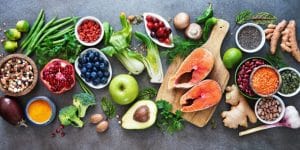 What is National Nutrition Month?
What is National Nutrition Month?
The Academy of Nutrition and Dietetics has designated March as National Nutrition Month. Their website invites everyone “To learn about making informed food choices and developing sound eating and physical activity habits.” Canton Public library is accepting this invitation and hope you will join us for a few tasty nutrition tips.
We all want to do what’s best for the health of ourselves and our families, but between the latest weight-loss fad diet and the bygone food pyramids of yore, it can be hard to separate the evidence-based recommendations from the whims of pseudoscience. Luckily, our librarians are information experts ready to help you cut through the noise.
So, where do I start?
A great place to begin is MyPlate.gov, the spiritual successor to the USDA Food Pyramid. Operated by the U.S. Department of Agriculture, MyPlate offers tons of information on the different food groups, including a short quiz you can take to get a personalized list of resources to help you balance your diet.
The Harvard School of Public Health offers a similar guide in the form of its Healthy Eating Plate. They also have their own version of the Healthy Eating Pyramid, which might look different from what you’re used to. This can feel jarring if you’re more familiar with one of the old pyramids or grew up hearing very different advice on what’s healthy or unhealthy.
When the original food pyramid was created, the designers wanted to communicate that the public should limit consumption of fats in general. But once scientists learned more about the differences between saturated and unsaturated fats, it became clear that some fats and oils are actually good for you to eat.
Similarly, there is a big difference between whole grains and refined carbohydrates, as well as between various sources of protein. More recent guides have been adjusted to make room for this new information to try to communicate these nuances.
 What else should I know?
What else should I know?
As with any public health guidance, it’s important to remember that these recommendations are based on the best scientific information available at the time. As we learn more, gain access to new technologies, and perform new studies, our understanding will grow and the recommendations will change to accommodate new information. Always look for the most recent, up to date information for the best advice.
Additionally, anyone with a blog can call themselves an expert, so it’s always a good idea to check your sources so that you know you’re getting quality information. Registered dietitian nutritionists (RDNs) are subject to rigorous standards upheld by the Academy of Nutrition and Dietetics.
A registered dietitian nutritionist is a food and nutrition expert who has met academic and professional requirements including the following:
- Earned a bachelor's degree with course work approved by the Academy of Nutrition and Dietetics' Accreditation Council for Education in Nutrition and Dietetics (ACEND). Coursework typically includes food and nutrition sciences, foodservice systems management, business, economics, computer science, sociology, biochemistry, physiology, microbiology and chemistry.
- Completed an accredited, supervised practice program at a healthcare facility, community agency or foodservice corporation.
- Passed a national examination administered by the Commission on Dietetic Registration.
- Completes continuing professional educational requirements to maintain registration on an ongoing basis.
 When someone has these credentials, they can generally be trusted as an expert in the field. But sometimes these folks can disagree on certain issues, and that’s okay, it's part of the scientific process. When this happens and you’re presented with seemingly contradictory information, do a little bit more research into what their peers have said about the issue and look for broad consensus.
When someone has these credentials, they can generally be trusted as an expert in the field. But sometimes these folks can disagree on certain issues, and that’s okay, it's part of the scientific process. When this happens and you’re presented with seemingly contradictory information, do a little bit more research into what their peers have said about the issue and look for broad consensus.
How can the library help?
The theme of National Nutrition Month in 2023 is “Fuel for the Future.” At CPL, we encourage you to celebrate by checking out one of our cookbooks full of recipes from around the world. Ask a librarian if you need help finding a specific recipe, or if you’d like more information on nutrition science. We love keeping our patrons well informed and well fed!



Add a comment to: Vital Vittles: National Nutrition Month